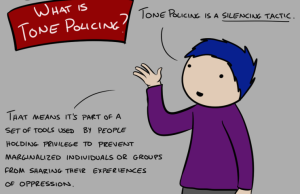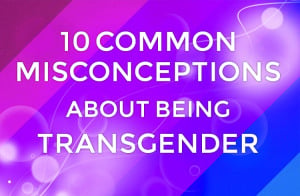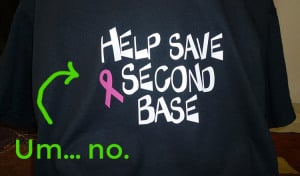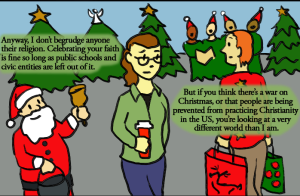Whenever I tell monogamous people that I’m polyamorous, I’m always met with a lot of curiosity.
While people sometimes act in a discriminatory manner, I often get a lot of respectfully phrased questions and musings.
“How does that work though?”
“If your partner doesn’t get jealous, how do you know they’re really into you?”
“How would it work if you wanted to get married or have children?”
The more questions I get, the more I realize that society has taught us a lot of heteronormative myths about love.
These myths limit our understanding of relationships, and result in discrimination against many groups of people – including polyamorous people.
You see, we’re socialized to believe certain things about love, relationship,s and sex. We’re told that some relationships are “good,” “normal,” and “acceptable,” while others are deviant and unnatural.
These underlying societal norms are influenced by something we call “heteronormativity.”
Heteronormativity upholds heterosexuality as the norm, but also results in us discriminating against folks in the sex industry, people who are into BDSM/kink, people who have premarital or extramarital sex, people who have sex for non-reproductive purposes, cross-generational partners, people who use sex toys… basically, everyone who has a kind of sex that we consider “weird” or abnormal.
Heteronormativity also pushes certain ideas about how romantic and sexual relationships work.
Whether you’re a monogamous person wanting to support polyamorous people, a polyamorous person coming to terms with their polyamory, or neither, accepting polyamory requires unlearning the heteronormative myths we’re taught about love.
Let’s reflect critically on a few of those myths!
1. We All Have ‘The One’/ A ‘Soulmate’
We make movies about it. We write books about it. We sing songs about it.
Society constantly pushes the idea that we all have a “Soulmate,” also known as “The One” – someone out there who is the perfect person for each of us.
There are a number of problems with this idea.
Firstly, it implies that a good relationship is pre-destined, rather than created and maintained through hard work.
I can’t count the number of times friends have been afraid to leave a toxic relationship because they fear their partner may be “The One.”
“What if this is my one true soulmate?” they ask. “What if I’m throwing this away and it’s the only true love I’ll ever feel?”
The opposite situation is possible, too. I had a friend who would put very little effort into relationships because they mused that if the relationship was “meant to be,” and if their partner was truly “The One,” the relationship would work out anyway.
Secondly, the notion of “The One” marginalizes aromantic people – that is, people who experience little to no romantic attraction.
Thirdly, the idea of “The One” erases polyamorous people.
We can love more than one person at once, and to deny that is to invalidate another person’s lived experience.
What if there are a number of people that I might have happy, healthy, simultaneous relationships with? What if there is no “One” person out there for me, but rather a number of people who might be compatible with me?
At the heart of this idea, is the notion that humans can only love one person at once. Which leads me to the next myth…
2. If Your Partner Wants Someone Else, It’s Because You’re Inadequate
It’s perhaps because of the “soulmate” myth that we believe having one romantic relationship is adequate for everyone. For this reason, many people have the notion that if you want to date a new person, it’s because your current partner isn’t good enough or adequate.
But why is that?
I know people who have more than one child, not because their first child is inadequate, but simply because they want more children.
I have more than one friend, not because any of them are inadequate, but simply because I want more friends.
Similarly, I might be in a romantic relationship with more than one person at a time. This isn’t because my current partner is inadequate in any way, but simply because I happen to want to date other partners, too.
If I fall in love with a new person, it’s a love independent of the one I share with my partner. My love for one person doesn’t replace the other; they simply coexist.
I’m of the belief that no single person can fulfill all of our needs and desires at once. My partner is extraordinary and incredible, and they can’t give me absolutely everything I need.
The reverse is true, too – as hard as I try, I can’t get my partner everything they want and need.
It’s not because something is wrong with either of us. It’s just because it’s impossible to give anyone everything that they need – and expecting someone to do so is to set yourself up for disaster. We all have so many different needs, and we need a number of different sources to attend to those needs.
The reason why I date my partner is because I love them dearly. They make me incredibly happy. Our relationship is healthy, nourishing, and beautiful.
None of those points require them fulfilling every need of mine.
Just because someone can’t provide everything another person needs, doesn’t mean they’re not valuable and important.
Monogamous people might be able to relate to this, too – as much as you may love your partner, it’s important to have other friends, too, because you get different things out of different relationships.
In polyamory, a myriad of different relationships – each with their own benefits, problems, and dynamic – can theoretically coexist.
3. Jealousy Is an Indicator of Love
If you love someone, you’d want them all to yourself. Right?
Well, no. But that’s what society teaches us.
I’m not saying that jealousy is an illegitimate feeling, nor am I saying that polyamorous people never feel jealous – trust me, sometimes we do!
Rather, I’m saying that we shouldn’t equate jealousy with love.
Polyamorous people often refer to the idea of “compersion” – the feeling of joy you experience when you see your partner take pleasure from another sexual or romantic relationship.
When my partner is excited about a new person, I’m excited for them, too. I love them deeply, and it makes me happy to see them happy – whether I’m the source of that joy or not.
Feeling jealous often stems from a feeling of inadequacy. As mentioned before, we often think that if our partner is attracted to someone else, it’s because we’re inadequate.
But that’s simply not the truth. Because I know I’m capable of loving more than one person at once, I believe my partner if they say they love other people as well as me.
Because I understand their attraction, I know their feelings towards others don’t mean I’m inadequate. Thus, I have no reason to be jealous, even though I love my partner very much.
Once again, I’m not saying that I never get jealous – rather, I’m saying that jealousy isn’t an indicator of love.
4. A Two-Parent Home Is Better for Children
Something that people often ask is what will happen if I want to have children one day.
This speaks to a lot of heteronormative ideas we have about families. We often believe that families work best when children live with their (biological, married) parents.
But sometimes, families work differently, and that’s okay!
I was raised by a single mother, my grandparents, my older siblings, and extended family, and I turned out fine.
If I do end up having children one day, and I’m part of a polyamorous situation at the time, I think my children will be really lucky.
The partners involved in a polyamorous situation can be a great source of support. Sometimes, partners share their time, energy and money with one another, meaning that one large network of support is formed.
So if I have multiple relationships while raising children, it’s likely that my children would be surrounded by love – not only from myself and my relatives, but from my partners, and their partners, too!
Maybe I’ll be in a situation like that. Maybe I’ll be in a monogamous relationship. Maybe I’ll be a single parent. Who knows?
What matters in a home is not the number of parents a child has, but rather the quality of the relationships between all family members.
5. Marriage Is the Ultimate Demonstration of Love
I can’t count how many times people have asked me, “But who would you marry?” when they heard that I had more than one partner.
Why is marriage so central to our ideas about love and relationships?
The way society prioritizes marriage over all forms of other relationships is problematic, to say the least.
In “Minimizing Marriage: Marriage, Morality and the Law,” philosopher Elizabeth Brake problematizes the notion of marriage. One important assertion she makes is that married relationships are socially and legally privileged over other relationships.
She points out that:
…the great social and legal importance accorded marriage and marriage-like relationships is unjustified and…this privilege harms, sometimes unjustly, those not oriented toward monogamous, central relationships. Those harmed include members of multiple significant overlapping friendships such as adult care networks or urban tribes, the asexual and the solitudinous, and the polyamorous.”
Think about it: How many legal benefits can someone get when they’re married? How does society react towards married couples, as opposed to society’s reactions towards unmarried couples?
Brake goes on to point to the norms surrounding marriage. She describes the concept of “amatonormativity” as follows:
the assumption that a central, exclusive, amorous relationship is normal for humans, in that it is a universally shared goal, and that such a relationship is normative, in the sense that it should be aimed at in preference to other relationship types.”
In other words, amatonormativity is the idea that everyone should work towards having one single romantic relationship, and that that relationship is the most important.
Some people value marriage, and that’s okay. But others don’t, and it’s unfair to imply that the legal recognition of some relationship(s) means that others are less valid and less important.
Ultimately, marriage is the state’s recognition of your relationship to someone. The state isn’t a partner in your relationship, so why should it get a say in defining how important it is?
Once we decenter the importance of marriage in our discussions about love and relationships, we can begin to accept the idea of polyamory.
***
These heteronormative myths are a big part of the reason why polyamory is seen by some as invalid, weird, and abnormal.
And these myths don’t only harm polyamorous people. They work together in a heteronormative culture, which ultimately harms a great deal of people.
For this reason, it’s imperative that we take notice of these myths and challenge them when they manifest.
If and when people experience romantic love, those experiences are diverse. If we’re to create an equal and non-oppressive society, we need to remember a simple truth:
There is no “right” way to love.
[do_widget id=’text-101′]
Sian Ferguson is a Contributing Writer at Everyday Feminism and a queer, polyamorous, South African feminist who is currently studying towards a Bachelor of Arts majoring in English and Anthropology. Originally from Cape Town, she now studies at Rhodes University in Grahamstown, where she works as vice-chair of the Gender Action Project. She has been featured as a guest writer on websites such as Women24 and Foxy Box, while also writing for her personal blog. Follow her on Twitter @sianfergs. Read her articles here.
Search our 3000+ articles!
Read our articles about:
Our online racial justice training
Used by hundreds of universities, non-profits, and businesses.
Click to learn more





















